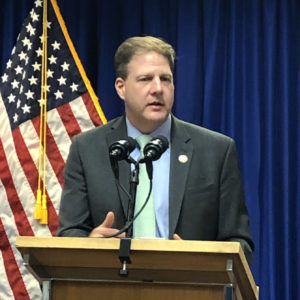Governor Sununu balked at the idea of creating a lieutenant governor in New Hampshire after House Republicans introduced a constitutional amendment to do just that.
“We’re good, we’re good. We don’t need a lieutenant governor,” Sununu said when NHJournal asked about the proposal on Tuesday. “New Hampshire’s gone without a lieutenant governor for over 200 years.”
“If you asked me what lieutenant governors in other states do, I don’t know. I gotta be honest,” Sununu added. “I’ve asked them. I’m not 100 percent sure what they do, but we have a great system in New Hampshire.”
The amendment introduced in the House would pose the question to voters in November 2022 for approval and would require a two-thirds majority of those voters.
Speaking for CACR 7, Rep. Michael Moffett (R-Loudon) said New Hampshire is one of only seven states without the position. He argued there is a strong case for creating a lieutenant governor in the constitution here.
In 2016, Senate President Chuck Morse (R-Salem) took control of the governor’s office for several days following then-Governor Maggie Hassan’s resignation after winning a U.S. Senate seat.
That was one of several incidents when a member of the opposite party assumed the duties of the chief executive in New Hampshire, Moffett noted.
Moffett told the committee his proposal created a largely honorary position, adding a state second-in-command “the New Hampshire way,” with a salary of just $125 per year, the same as the Senate president’s.
Before the elder Sununu, John H., became governor in 1983, the previous governor, Hugh Gallen, fell ill and passed away with seven days remaining in his term. Sununu had beat Gallen in the 1982 election.
Vesta Roy, a Republican, became the first female Senate president in that same election. She became acting governor upon Gallen’s passing – but never formally took the oath of office. New Hampshire’s Constitution allows the Senate president to act as interim governor, followed by the speaker of the House, secretary of state, and the state treasurer.
Should a vacancy occur while there’s a year or more left in a governor’s term, the constitution calls for a special election.
It provides that the Senate president, while serving as acting governor, may not act as president of the Senate or as a state senator. That holds true for any speaker of the House, secretary of state, or state treasurer that is acting as governor due to a vacancy.
In Vesta Roy’s case – had Gallen won re-election – she would have served as governor until a special election was held to fill the seat. While serving, she would have been prohibited by the constitution from her senate duties until the governor’s seat was filled, and she could then resume the duties of Senate president.
“I think we can do this, and I think we should do this,” Moffett said, telling the committee the measure improves the line of succession and precludes the potential for chaos that could ensue if a governor’s term came to an untimely end.




